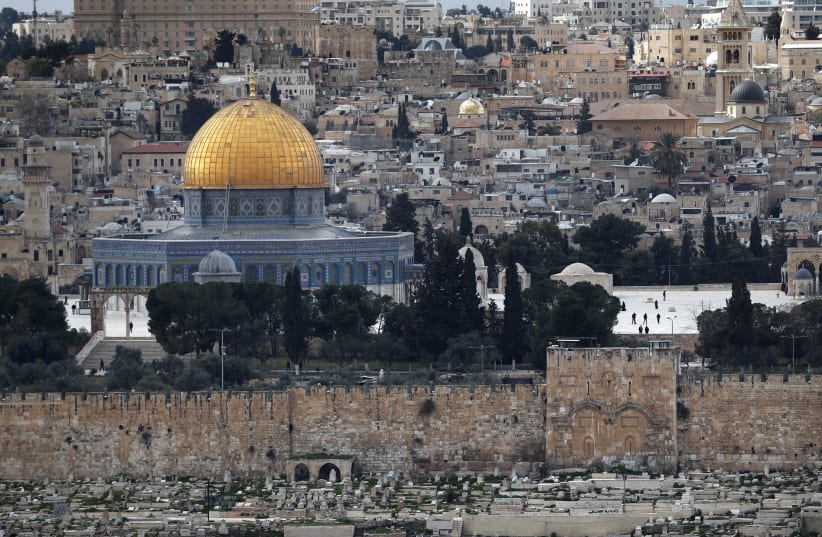In June, the Supreme Court ruled that the sale of property in the Christian Quarter to the Jewish organization Ateret Cohanim was “perfectly legal” and that the buildings should be transferred to the Jewish group.
However, the Patriarchate said it has new evidence that it hopes will overturn this decision.
In a statement on Monday, the Patriarchate made it clear that its properties located within the walls of Old City Jerusalem “are for the service of pilgrims and visitors of the Holy City, especially those on the pilgrim route to the Church of the Holy Sepulchre.
“The Patriarchate will continue to exercise its right and duty of defending itself, the holy sites and the Church heritage," it said.
It highlighted that this new evidence confirms that Ateret Cohanim and its companies “forged documents and initiated court proceedings based on these forged documents,” adding that Ateret Cohanim knew all along that they were forged.
In 2005, major controversy erupted between the Church and Israel after it was revealed that Ateret Cohanim had leased the Petra Hotel and the Imperial Hotel near the Jaffa Gate in the Old City, as well as a building known as Beit Azmiya in the Bab al-Huta neighborhood for 99 years with an option for renewal.
The original lease was signed in 2004 under the Greek patriarch Irenaios, who denied that he had any knowledge of it and tried to claim it was void. At the time, he blamed the Church’s director of finance, Nicholas Papadimas, making claims that Papadimas was bribed by the Jews.
When the sales were made public in 2005, Irenaios was forced to step down and Theophilos replaced him. The current patriarch brought the case before the District Court, which rejected it along with the Supreme Court in June.
"Among evidence attained by the Patriarchate are documents dating back to 1996 showing that the radical’s financial supporter, billionaire and financier Irving Moskowitz, had reached an agreement with one of the tenants of the Petra Hotel to buy the protected lease rights for $ 4.5 million, in addition to his willingness to pay for other expenses as well as the adjacent “Little Petra Hotel,” the Patriarchate explained. "This is a clear proof of the corruption of the suspicious deals of 2004, since it is unreasonable to agree to buy the tenants’ ‘protected lease rights’ for $ 4.5 million in 1996, while 9 years later - in 2004 - to claim to have purchased from the Patriarchate (the owner of the properties) the property itself, including a further hostel, being the ‘Little Petra Hotel,’ for a mere $500,000."
According to the Patriarchate, Ateret Cohanim “used to pay bribes to ‘manage their affairs’ in connection to the church properties.
“These efforts coincided with local civic authorities, such as the Municipality of Jerusalem and the local Tax Authority, imposing arbitrary measures against tenants of the church properties resulting in the weakening of their position," the statement read.
Ateret Cohanim has been working to legally purchase Arab-owned property in the eastern part of Jerusalem. It has a yeshiva located in the Muslim quarter, and aims to increase the Jewish presence in all areas of the Old City.
However, the Patriarchate has continuously disputed this.
The Patriarchate noted that the new evidence also includes documents signed by leaders of Ateret Cohanim, “as well as audio recordings by its managing director Mati Dan and advocate Eitan Geva, that prove that they lied and concealed facts during the legal proceedings in court.”
In addition, “the evidence shows that the suspicious deals of 2004 involved bribes by Ateret Cohanim, and all indications point to the bribes being paid to the then Patriarchate employee, Nicholas Papadimas," it stated.
Following receipt of this new evidence, the legal advisers of the Patriarchate worked relentlessly to examine, revise and evaluate this evidence. The legal advisers concluded that the new evidence obtained by the Patriarchate, following the decision of the High Court of Justice in favor of the radical Ateret Cohanim, should prompt the Court to reconsider its decision.
The Patriarchate also called on heads of states, heads of churches from around the world and “all those who strive for peace and justice in the Holy Land, to protect the historic and legal doctrine of the ‘Status Quo,’ relating to the Holy Shrines, and to defend the Holy Sites from all underhanded and immoral dealings.”
Maayan Hoffman contributed to this report.
